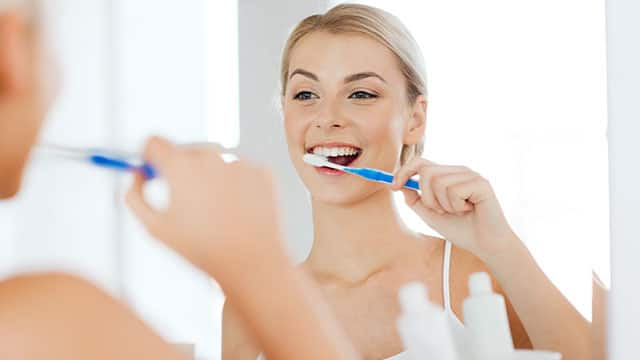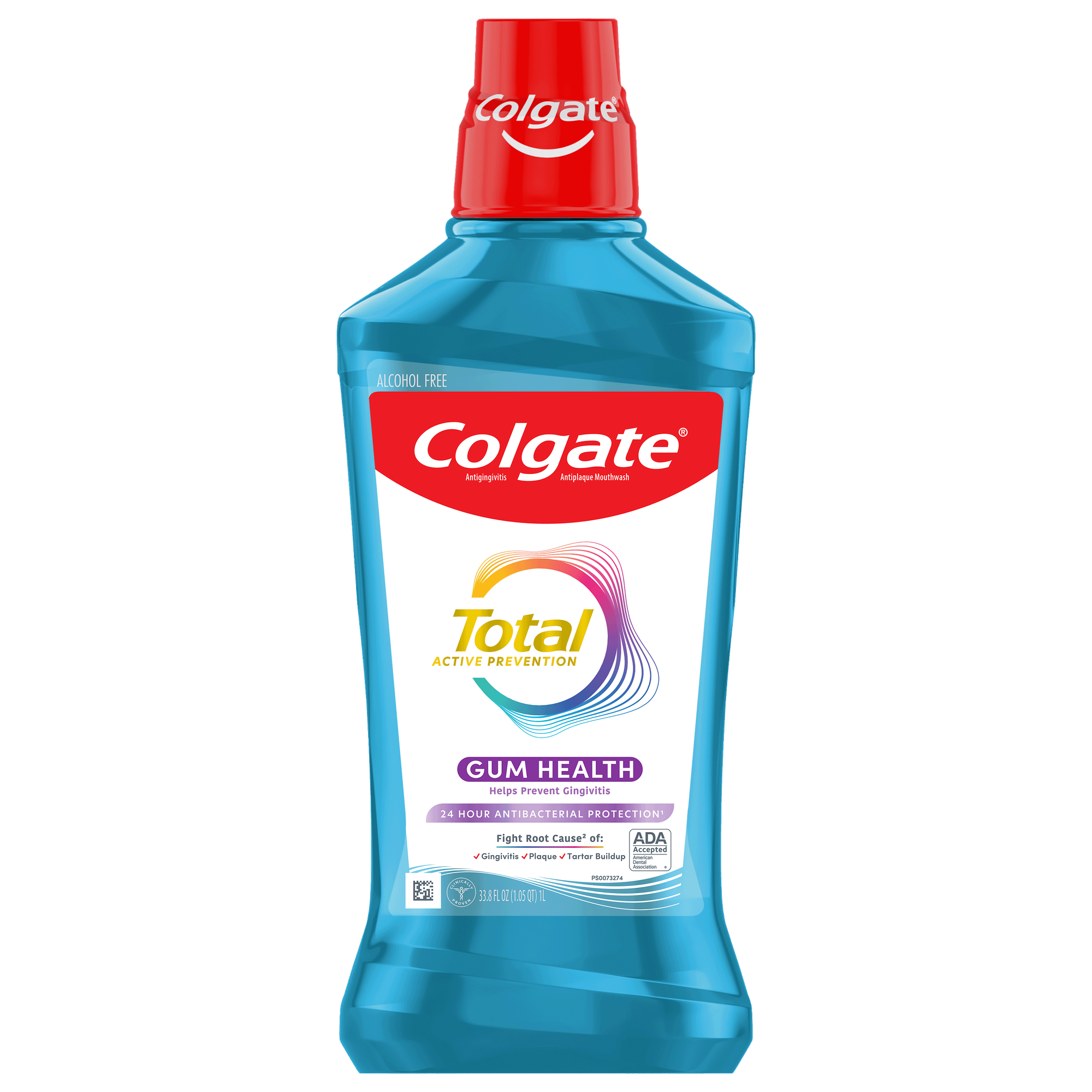Maintain an Oral Health Care Routine
If you ask yourself, "How can I care for my teeth as I age?" the answer is to do these five essential things consistently throughout your adult life:
- Brush twice daily with fluoride toothpaste to remove plaque, the sticky film on your teeth that's the main cause of tooth decay.
- Floss or use an interdental product daily to remove plaque from between your teeth and under your gumline – before it can harden into tartar. Once tartar has formed, it can only be removed by a professional cleaning.
- Rinse daily with a mouthwash or mouth rinse designed to prevent plaque.
- Limit sugary or starchy foods, especially sticky snacks. The more often you snack between meals, the more chances you give the acids in plaque to attack your tooth enamel.
- Visit your dentist regularly for professional cleanings and checkups.
While you're at it, purchase brushes, toothpaste, floss, rinse, and other products with the American Dental Association (ADA) seal to ensure high quality. And you want the very best products to take care of your oral health.
Be Aware of Special Dental Issues
The older you get, the more susceptible you are to oral health issues. Luckily, you can help head off these issues with a consistent oral health care routine (see above). But if oral issues arise, your dental professionals can help with diagnoses and treatments.
Periodontal (Gum) Disease
Your oral care routine doesn't just save your teeth. Your home dental regimen could help you prevent these types of gum disease:
- Gingivitis is the first stage of gum disease. Symptoms include red, swollen, or tender gums that tend to bleed when you brush them. The good news is that gingivitis in its early stages is reversible. So, if you notice any gingivitis symptoms, see your dentist before a more serious problem develops.
- Periodontitis is that more serious problem. With this condition, your gums can start receding and might lead to tooth loss. We definitely don't want that to happen!
The health of your gums might also affect your overall health – or be a sign of a serious health problem. The American Academy of Periodontology (AAP) reports links between gum disease and other diseases, such as diabetes, heart disease, osteoporosis, respiratory disease, and cancer.
Tooth Decay (Cavities)
Not only can you develop cavities in previously healthy teeth, but you can get cavities around existing fillings (called recurrent decay). And decay on the root surfaces of the teeth is more common in adults.
Tooth Sensitivity
When gums tissue recedes as a result of periodontal disease or from wear and tear caused by improper toothbrushing technique, the root of the tooth becomes exposed. Since the root isn't protected by enamel, it's prone to produce sensitivity or pain to cold/hot foods and beverages. In severe cases, cold air and sensitivity to sour/sweet drinks and foods can occur.
If you experience sensitivity, try a toothpaste made for sensitive teeth. If the problem persists, see your dentist, as the sensitivity might indicate a more serious condition, such as a cavity, a cracked or fractured tooth, or nerve exposure.
Damaged Teeth
Whether due to decay, disease, or trauma, damage to your teeth more likely will occur the longer you live. If that happens, there are fixes to restore your smile:
- Crowns entirely cover (or cap) a damaged tooth to strengthen the tooth – and improve its appearance, shape, or alignment.
- Implants and bridges replace missing teeth. Consult with your dentist to find out the better option for you.
Make Your Smile Brighter: How You Can Help Your Teeth Look Whiter
Tooth whitening products and procedures depend on the type of stain you wish to remove.
External (Surface Enamel) Stains: To remove most teeth stains caused by food, wine, tobacco, and other substances:
- See your dental professional regularly for thorough cleanings.
- Use a whitening toothpaste to help remove surface stains between dental visits.
- Carefully follow instructions to whiten your teeth with over-the-counter teeth whitening products.
If you've had surface stains for years, you might want to have your teeth professionally whitened to remove these more stubborn external stains.
Internal (Enamel) Stains: These stains can be professionally bleached, bonded with veneers, or capped with crowns. While each method is safe and effective, your dentist can recommend the treatment most appropriate for you. Professionally treating the stains is dependent on the state of your teeth and the results you wish to achieve.
Consume a Healthy Diet for Oral Health Care
In addition to positively impacting your overall health, proper nutrition is necessary for healthy teeth and gums. Eating a well-balanced diet gives your gum tissues and teeth the important nutrients and minerals they need to stay strong and resist infections. Yay!
Since we're all about your overall and oral health, you want to ensure you're aware that:
- Firm, fibrous foods such as fruits and vegetables tend to help clean the teeth and tissues.
- Soft, sticky foods tend to remain in the grooves and between teeth, producing more plaque.
- With foods and drinks containing sugars or starches, the bacteria in plaque produce acids that attack your teeth for 20 minutes or more.
- To reduce damage to your tooth enamel, limit the number of between-meal snacks and drinks. And when you do snack, choose nutritious foods such as cheese, raw vegetables, plain yogurt, or fruit.
So, there you have it: the basics of helping you look after your teeth and gums as an adult. And the best part: With a consistent oral health care routine and a healthy diet, your teeth are more likely to remain relatively white and decay-free. And wouldn't it be wonderful if you can go from young adult to senior citizen with your healthy, original teeth?!
Oral Care Center articles are reviewed by an oral health medical professional. This information is for educational purposes only. This content is not intended to be a substitute for professional medical advice, diagnosis or treatment. Always seek the advice of your dentist, physician or other qualified healthcare provider.
ORAL HEALTH QUIZ
What's behind your smile?
Take our Oral Health assessment to get the most from your oral care routine
ORAL HEALTH QUIZ
What's behind your smile?
Take our Oral Health assessment to get the most from your oral care routine















